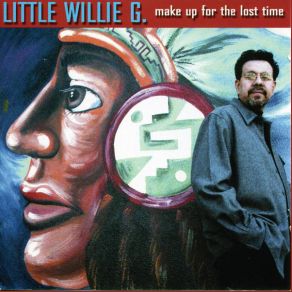Make Up for the Lost Time
Download links and information about Make Up for the Lost Time by Little Willie G.. This album was released in 2000 and it belongs to Hip Hop/R&B, Soul genres. It contains 12 tracks with total duration of 45:44 minutes.

|
|
|---|---|
| Artist: | Little Willie G. |
| Release date: | 2000 |
| Genre: | Hip Hop/R&B, Soul |
| Tracks: | 12 |
| Duration: | 45:44 |
| Buy it NOW at: | |
| Buy on iTunes $9.99 | |
| Buy on Amazon $9.49 | |
Tracks
[Edit]| No. | Title | Length |
|---|---|---|
| 1. | Open the Door to Your Heart | 2:52 |
| 2. | Don't Let Me Lose This Dream | 2:59 |
| 3. | Come Back Baby | 2:55 |
| 4. | Here I Go Again | 3:08 |
| 5. | Make Up for the Lost Time | 4:15 |
| 6. | It'll Never Be Over for Me | 4:22 |
| 7. | Joy In the Palace | 4:38 |
| 8. | (I Wanna) Testify | 4:05 |
| 9. | These Hands (Small But Mighty) | 3:01 |
| 10. | To Be With You | 2:52 |
| 11. | Cultura | 4:17 |
| 12. | A World Where No One Cries | 6:20 |
Details
[Edit]The teenaged lead singer for Thee Midniters and later Malo revives the "brown-eyed soul" sound he pioneered with his '60s band for this, his first solo release. Recorded in 2000 while in his early fifties, Little Willie G.'s voice has grown deeper and more expressive through the years. This album — produced by Los Lobos' David Hidalgo — perfectly frames Little Willie's vivid vocals, surrounding them with horns, perky Latino percussion, jaunty pianos, and glossy backing singers. As comfortable with smooth R&B-crooning ballads like Aretha Franklin's "Don't Let Me Lose This Dream" as with the title track's jazzy big band arrangement and the War-styled East L.A. groove of "It'll Never Be Over for Me" (a remake of an old Midniters tune), the singer sounds assured yet sensitive on this terrific comeback. The upbeat tunes — such as a rollicking version of the Parliaments' "I Just Wanna Testify," Bobby "Blue" Bland's "These Hands (Small but Mighty)," and the opening "Open the Door to Your Heart" — all punctuated by staccato horns and easygoing, slinky rhythms, take a back seat to the album's sometimes overly slick, loungy ballads. Thankfully, Hidalgo keeps the focus on Willie G.'s warm vocals and subtle phrasing. From the traditional mambo-salsa of "Cultura" — one of the three originals — to the uplifting near-gospel of Bobby Womack's "A World Where No One Cries," Little Willie G. shows that the low-ridin' East L.A. R&B sound is alive and well.